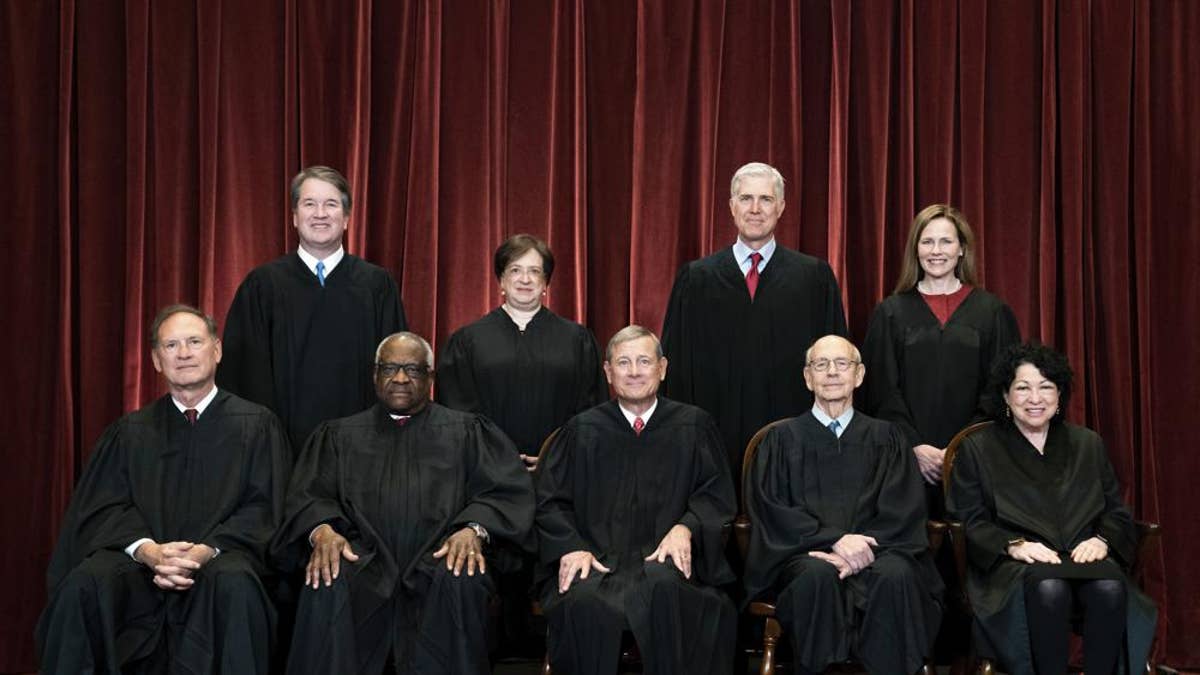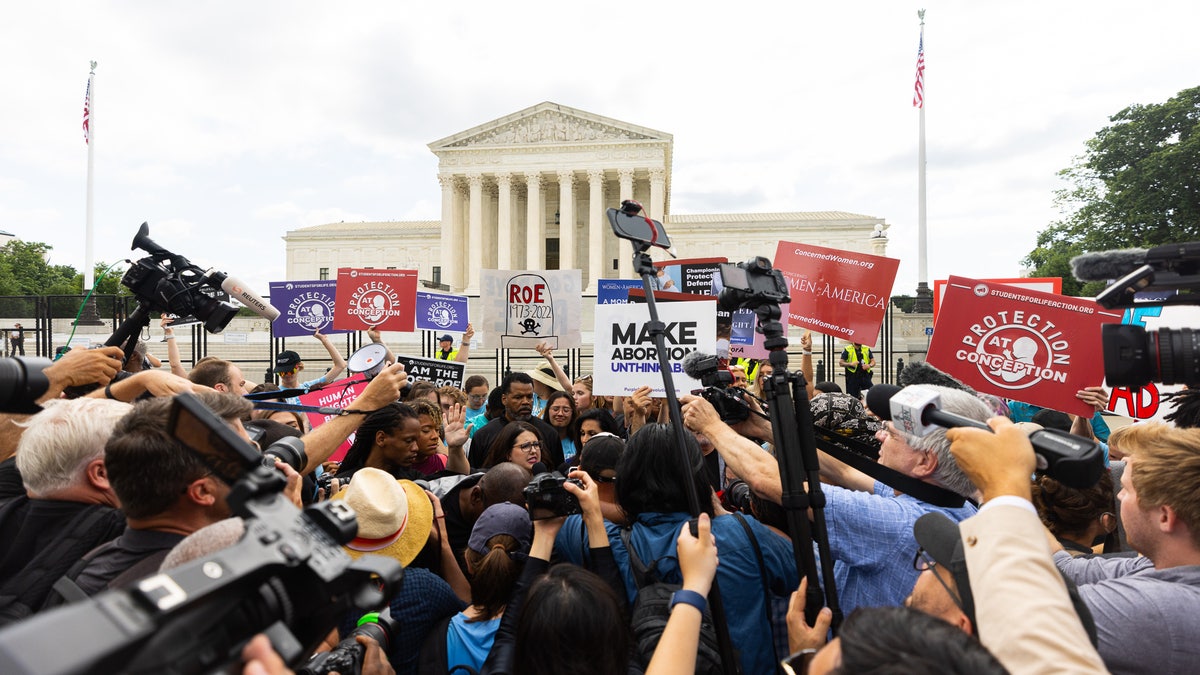Fox News Flash top headlines for June 27
Fox News Flash top headlines are here. Check out what's clicking on Foxnews.com.
The Supreme Court’s decision overturning the constitutional right to abortion is a disaster. Even Americans who like the outcome because they oppose abortion should find the ruling deeply troubling because it treats the sacrifice that women undertake in reproduction as if it were a minor inconvenience. In particular, the opinion manifests no appreciation for what women who do not want to be pregnant endure when the government compels that status upon them.
Many people think that because the Constitution says nothing about abortion, it follows that the Constitution does not protect abortion. But that kind of logic does not suit a Constitution written in general terms to serve the people over the course of centuries.
The Constitution does not contain the word "Internet," but the Supreme Court, in Reno v. ACLU, rightly construed the First Amendment to protect online speech. To similar effect, the Supreme Court long ago ruled, in Rochin v. California, that the government violates the Fourteenth Amendment Due Process Clause when it "shocks the conscience" by inducing a criminal suspect to vomit narcotics that he allegedly swallowed, even though the Constitution does not contain guidance on the practice and we have no history of prohibiting the use of emetics by government or private individuals.
SUPREME COURT OVERTURNS ROE V. WADE IN LANDMARK OPINION
When the government forces a woman to remain pregnant against her will, it thereby generates an enormous amount of often-crippling nausea, far more than it does by giving a criminal suspect an emetic on one occasion. So why is the emetic shocking and thus unconstitutional, while forced pregnancy is not?
The Supreme Court has also said, in Winston v. Lee, that ordering surgery on a suspect on the basis of mere probable cause (to believe his body contains evidence of crime) is unconstitutional. Forced pregnancy will frequently lead to surgery as well. In the United States, C-sections account for about a third of deliveries. Why would the Constitution protect criminal suspects from forced surgery but allow laws that will effectively require thousands of women to conclude an unwanted pregnancy with unwanted surgery?
Now one might object that the right to liberty ends when its exercise results in harm or death to another. If one thinks that a zygote, embryo, or fetus is a human being entitled to life, then one could say that the interest in that life outweighs the infringement of a pregnant woman’s liberty that abortion prohibitions impose.
SUPREME COURT ROE V WADE DECISION REAFFIRMS WHY WE MUST FIGHT TO ELECT PRO-CHOICE, DEMOCRATIC WOMEN
That is a fair point. Reasonable people can disagree about when and how to balance a woman’s liberty against the interest in life of the zygote, then embryo, then fetus developing inside her.

Members of the Supreme Court pose for a group photo at the Supreme Court in Washington, April 23, 2021. Seated from left are Associate Justice Samuel Alito, Associate Justice Clarence Thomas, Chief Justice John Roberts, Associate Justice Stephen Breyer and Associate Justice Sonia Sotomayor, Standing from left are Associate Justice Brett Kavanaugh, Associate Justice Elena Kagan, Associate Justice Neil Gorsuch and Associate Justice Amy Coney Barrett. (Erin Schaff/The New York Times via AP, Pool, File)
What makes Justice Samuel Alito’s majority opinion in last week’s abortion case so unpersuasive is that it dismisses altogether and barely even discusses a pregnant woman’s interest in termination.
The majority says nothing about the nausea, vomiting, gestational diabetes, high blood pressure, pain, insomnia, anxiety, and many other kinds of sickness that pregnancy often inflicts. The majority also says nothing about rape or incest, even though the Mississippi law before the Court contains no rape or incest exception.
Instead of acknowledging the tremendous costs of forced pregnancy that women will immediately suffer after last week’s opinion—including a woman’s substantially increased risk of death —the opinion departs from the particulars of the 15-week ban at issue in the case to tell legislatures that from the moment of conception, bans are a-okay.
SUPREME COURT RULING PROVES WE WEREN'T 'HYSTERICAL,' WE WERE RIGHT
If I disagreed with someone I respected about a matter that the majority acknowledges is "a profound moral issue on which Americans hold sharply conflicting views," I would—in addressing them—make sure to "show my work," as math teachers like to say. I would discuss the countervailing considerations, especially if I were writing upwards of 70 pages. Justice Alito, however, fails to do so.

Supreme Court Justice Samuel Alito addresses the audience during the "The Emergency Docket" lecture Thursday, Sept. 30, 2021 in the McCartan Courtroom at the University of Notre Dame Law School in South Bend, Ind. (Michael Caterina /South Bend Tribune via AP)
Indeed, in an opinion that ignores the individual interest at stake for women experiencing an unwanted pregnancy, the majority quotes from seventeenth century English jurist Sir Matthew Hale. Hale said that terminating a fetus at or after quickening (when the woman can feel the fetus moving inside her) is a "great crime."
CLICK HERE TO GET THE OPINION NEWSLETTER
Hale, proving his bona fides as a misogynist from over 300 years ago, sentenced two women to death for witchcraft, spoke enthusiastically of every husband’s legal and moral entitlement to force intercourse upon his nonconsenting wife, and promoted the sexist (and factually unsupported) view that jurors must bring a profound skepticism to the claims of the remaining rape victims (those whose alleged assailants could not take advantage of the marital rape entitlement).

Crowds outside the Supreme Court reacting to the Dobbs ruling. (Joshua Comins/Fox News)
One walks away from the Court’s abortion opinion with the sense that even a one-celled zygote takes absolute priority over the lives and experiences of women. Indeed, the Court says nothing about whether the Constitution would stop the government from banning an abortion needed to save the life of the mother.
I understand that people who regard themselves as pro-life may not be ready to change their minds. But I hope I have helped readers understand why I and many others regard the abortion decision as among the most disrespectful to issue forth from the high court.
CLICK HERE TO GET THE FOX NEWS APP
Justice Alito had a month and a half to change his leaked draft into something less dismissive and contemptuous of pregnant women who feel the need to exit their pregnancies. But he left the draft almost completely unedited.
That too speaks volumes about how he and at least four of his colleagues view the American women who object to involuntary pregnancy and labor.











































